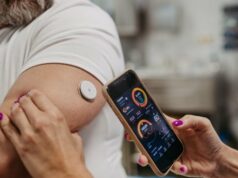Low carbohydrate eating leads to significant improvements in blood pressure and cardiovascular risks in people with type 2 diabetes, new research suggests.
UK scientists including Dr David Unwin discovered that over the course of two years, going low carb led to deprescription of 21.5% of total blood pressure drugs among the participants.
Dr Unwin, who helped developed the NHS-approved Low Carb Program app, conducted the study alongside UK researchers from Southport, Glasgow, Liverpool and London.
The research team said: “Our work helps highlight how this simple dietary approach may also bring additional and so far under reported improvements to the increased cardiovascular risks that people with type 2 diabetes and impaired glucose tolerance face.”
The study involved 154 people with type 2 diabetes or high-risk of type 2 diabetes who were retrospectively analysed based on their diet.
“We concentrated particularly on advising a dramatic reduction in total dietary sugar, explaining that this involves not just cutting back on table sugar itself but starchy carbohydrates like bread, cereals and potatoes that are themselves made up of glucose (in the form of starch),” wrote the researchers.
The effect of low carb eating was observed for two years alongside the impact on participants cardiovascular risk factors, such as high blood pressure.
There were “significant and substantial reductions” in blood pressure, as well as weight, and participants who went low carb experienced improve lipid (blood fat) profiles too.
The findings existed alongside the 21.5% reduction in blood pressure medications, and the researchers now want to test their findings further in larger trials.
“This novel and potentially highly effective dietary modification, done very cheaply alongside routine care, offers hope that should be tested in a large prospective trial.”
The results appear in the International Journal of Environmental Research and Public Health.








